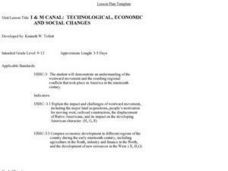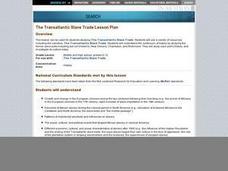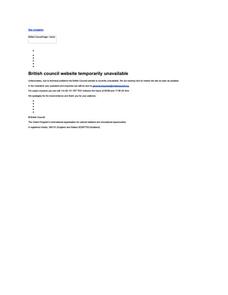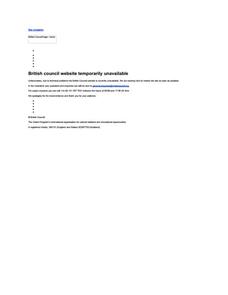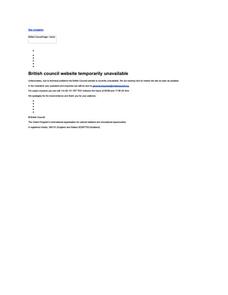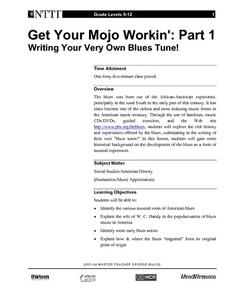Curated OER
Sweet Clara and the Freedom Quilt
Students read and understand the book Sweet Clara and the Freedom Quilt. In this language lesson, students understand the Ebonics and colloquialisms of the book. Students discuss the events and vocabulary used. Students explain their...
Curated OER
African Popular Music
Learners explore popular music of West Africa. In this musicians lesson, students complete listening tasks that challenge them to analyze the music of Oumou Sangare, Angelique Kidjo, and Baaba Maal.
Curated OER
Social Studies: The Ideology of Slavery
Students examine the development of racial stereotyping beginning with the antebellum years. They research how blackface minstrel songs reinforced the antebellum mindset of African-Americans. Secondly, students investigate "Uncle Tom's...
Curated OER
From Sea to Shining Sea
Students study the geography of the United States of America. Students write letters, create travel brochures, make maps, graph population numbers, read fiction and nonfiction selections, complete KWL charts, and watch films.
Curated OER
We Arrived 10,000 Years Ago...
Students explain ways that humans migrated from Asia and settle in the Americas. In this investigative lesson students participate in a brief archaeological demonstration and review what they learned.
Curated OER
Entrepreneurs and the African-American Dream
Students make a simple graph of labor supply and labor demand in the North and South in the early twentieth century. They conduct research to identify top contemporary African-American entrepreneurs.
Curated OER
The Abolitionist Movement: A Fight for Freedom
Sixth graders investigate the Civil War by identifying famous figures of the era. In this slavery abolitionist lesson, 6th graders read a text on the history of the Civil War and discuss heroes of the era such as Harriet Tubman and John...
Curated OER
I & M Canal: Technological, Economic
High schoolers read about and discuss the reasons European countries were interested in the Ohio Valley. They complete a puzzle to review vocabulary and watch a video on the Illinois Prairie and the I & M Canal. They rewrite the...
Curated OER
The Rooster Who Went to His Uncle's Wedding
Second graders read and discuss the story "The Rooster Who Went to His Uncle's Wedding" in the Scott Foresman series. They summarize the story. They understand the influence of Latin American Folktales. They complete a quiz on the story.
Curated OER
We've got the whole world in our hands
Students explore spatial sense in regards to maps about the globe. In this maps lesson plan, students label oceans, locate the continents and poles, follow directions, and explain the symbols on a map.
Curated OER
Why Do Immigrants Come to the United States of America?
Students appreciate the diversity of motives for immigration to the United States. They gather first person data and develop a persuasive presentation. They create a historical comparison of the motives for immigration to the community.
Curated OER
The Transatlantic Slave Trade Lesson Plan
Students study former slave ports in the South.
Curated OER
Differences in Location Lesson Plan: Treatment of Early African Americans
Students reach The Domestic Slave Trade, then examine the differences between the people enslaved in North America as opposed to those in Brazil.
Curated OER
Immigration in the Connecticut River Valley
Young scholars discuss and compare immigration during the 18th century to the Connecticut River Valley to that in America during the turn of the century.
Curated OER
The Slave Trade
Students map and explore a possible slave trade route. In this slave trade mapping lesson plan, students calculate the distance and amount of time it would take for African slaves to arrive in America.
Curated OER
Regional Songs in the Southern American Experience
Students write a song about transportation in 100 years after comparing and discussing "Proud Mary" and "The Midnight Special".
Curated OER
Romans of the New World
Who were the Iroquois, and how did they compare with the Romans? Attached is a three-page article and a set of accompanying questions. Only four questions are included, but you could require your readers to write two or three...
Curated OER
Simple Texts for Primary Pupils
Can literacy get any more fun than this? Learners not only have fun, but gain confidence as well when presented with familiar text in another language. Select books, songs, poems, even recipes written in another language, and using the...
Curated OER
Teaching Numbers with Primary Pupils
One, two, three. Un, deux, trois. Eins, zwei, drei. Primary learners love to count and this lesson contains a series of games that encourage learners to count in English, French, German, and Spanish. The exercises develop literacy and...
Curated OER
Memory Games
Researchers say that we need to hear and see new language 12 times before we remember it! Here's a plan that details a series of games that can be used as memory exercises. Bingo, Noughts and Crosses, Pelmanism, and repetitive speaking...
Curated OER
A Light in the Storm
Examine the genre of historical fiction while reading A Light in the Storm. They extract events in chronological order to make a timeline. Then, they use information in the book important to the characters to create a presentation of an...
Curated OER
Get Your Mojo Workin': Part 1 Writing Your Very Own Blues Tune!
Upper graders listen to the blues. They discuss blues scale, read a description of the blues, and work together to write an original piece. A lesson plan like this ties into American history and African-American musical contributions...
K5 Learning
Musical Instruments to Play
Bring some music to your language arts lesson with a reading comprehension activity. Learners read an informational passage about different musical instruments before answering a series of comprehension and vocabulary questions.
Curated OER
What's the Weather Like? Primary Level
Elementary schoolers and language learners will shine with a series of games and activities that feature weather words. The exercises can be adapted for pairs, small groups, or whole class participation.









